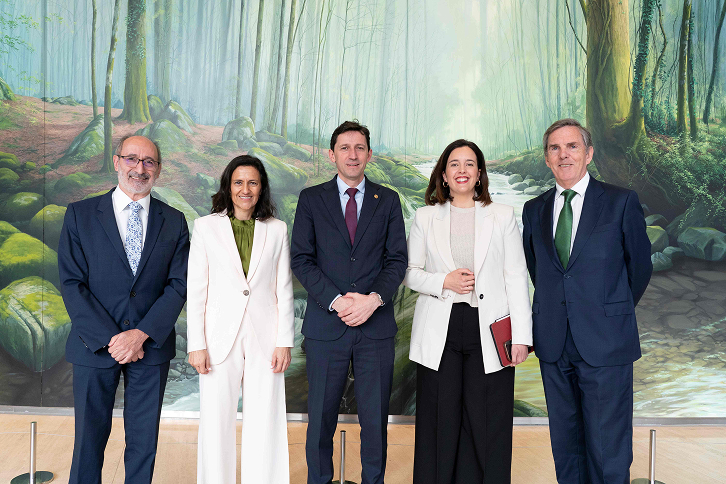News
2025-04-08 09:23:00.0 - 2025-04-08 09:23:00.0 UTC +02:00APD and Iberdrola discuss the new international tax landscape
- The meeting, held in the Iberdrola Tower, was attended by more than 180 people
- The Basque Minister of Finance, Noël d'Anjou, pointed out that the Basque Country participates directly in the EU’s, the OECD’s and the G-20’s decision-making groups
Representatives of the Basque and Spanish governments, the European Commission and executives of large companies met today at Torre Iberdrola at a conference organised by the Association for Progress in Management (APD in Spanish) entitled The New International Tax Landscape: Legal Certainty as a Basis for Competitiveness and Business Investment, to discuss the future of global taxation.
The meeting was opened by Asís Canales, Director of Resources and Services and institutional representative in the Basque Country of the Iberdrola Group, who argued that a good fiscal policy can generate more and better business activity and with it more jobs, more wealth and more public revenue: ‘An excellent fiscal policy has to have medium-term planning, where the constraints of today do not jeopardise the growth of tomorrow’, he said.
This was followed by Eduardo Junkera, president of APD's northern region and director of the Egile Corporation XXI Group. After them, the Basque Minister of Finance and Treasury, Noël d'Anjou, spoke about legal certainty as a basis for competitiveness and business investment.
D'Anjou highlighted the growing weight of the Basque Country in international decision-making: ‘The agreements reached in the last three meetings of the Joint Economic Agreement Commission have strengthened the position of the Basque Government in the construction of a global Euskadi, being able to be present and participate in high-level groups. This means having our own voice in the bodies of the Economic and Financial Affairs Council of the European Union (Ecofin) and in the forums of the OECD and the G-20 where the international standards of business taxation are being designed’.
The Sailburu added that ‘this allows us to raise our international visibility several notches and enables us to actively participate in forums where the taxation of the future is analysed and planned’.
Electricity Taxation
Begoña García-Rozado, Global Head of Taxation at Iberdrola, stated that ‘legal certainty is key to advancing in electrification, and the EU is trying to promote it through measures like the Clean Industrial Deal. Europe has taken the initiative to make sure electricity is not penalized and to ensure it can compete on equal terms with Asia and the United States, where there are no specific taxes on electricity. Now is the time for member states to take note and to take action.’
‘In Spain, in addition, electricity is subject to the maximum 21% VAT, a Special Tax at 5.1%, and the Tax on the Value of Electricity Production at 7%. On top of that, there is a hydroelectric fee and regional taxes on renewables. Iberdrola is subject to more than 70 electricity-related taxes worldwide, the vast majority of which are in Spain, where it faces 40 electricity taxes, including 26 regional ones,’ she pointed out.






